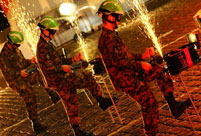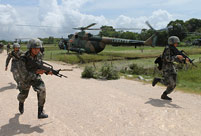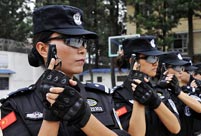Since the dissolution of the USSR, Russia has identified the post-Soviet space as an area of crucial importance for its core strategic interests. Unlike the Soviet Union, present-day Russia does not pretend to play a global political role. Rather, its ambitions in the international arena and its sources of influence are strictly dependent on, and limited by, its status as a nuclear power and position as a permanent member of the UN Security Council.
Many Western experts are perplexed by Moscow's determination to preserve its domination in the USSR area. However, Russia's geopolitical strategy is not intended to produce an "imperial resurgence" or "re-Sovetization" of this part of the world.
Its policy toward Central Asia clearly confirms this. Moscow's approaches there are determined first and foremost by pragmatic reasons especially in the security sphere.
Considering the growing Islamist threat in the North Caucasus and the Volga region as well as the extremely porous border with Kazakhstan, the possible collapse of regional security in Central Asia would pose a dangerous challenge to Russia.
Moscow is particularly concerned about potential Afghan risks after NATO withdrawal in 2014.
The only government to recognize the independence of the Chechen Republic of Ichkeria was the Islamic Emirate of Afghanistan, then controlled by the Taliban. But Islamism is less of a challenge than drugs.
According to the Federal Drug Control Service of Russia, the Afghan heroin imported via Central Asia to Russia every year kills twice as many people as the number of Soviet soldiers killed in the country's 10 years in Afghanistan (1979-89).
Russia's economic interests in Central Asia are also quite practical. Moscow is interested in developing mutual cooperation with countries in the region, especially in energy and transportation. And ethnic Russians make up a significant minority in most Central Asian countries.
Thus it is no coincidence that some of Central Asian states are considered to be Russia's most reliable partners in the post-Soviet space, be it in the Collective Security Treaty Organization, or the Eurasian Economic Community.
Central Asia has some particularities for Moscow. It is less perceived as a highly competitive area with the US. The countries in the region have no clear aspirations to NATO or EU membership and their balancing between Moscow and Washington has been most frequently determined by their own bilateral disputes and the dynamics of regional competition, especially between Uzbekistan and Kyrgyzstan or Kazakhstan.
Moreover, the fight against terrorism in Afghanistan since 2001 has brought Russian and US interests ever closer together despite numerous disputes on other issues, including Iran or other parts of the post-Soviet space.
Nevertheless Russia is concerned about the strengthening of mutual relationship between Washington and Central Asian countries, considering them as a challenge for its privileged role.
Unlike the South Caucasus, Central Asia looks like an arena of trilateral cooperation and competition. Moscow sees Beijing as a counterweight to US aspirations. At the same time, Russia, alongside China and others, is in the mid of a long-running dispute with the West over the inviolability of state sovereignty in times of conflict and the justification for intervention in domestic political processes.
However, China is very effective at promoting its economic interests in the region. Beijing is a competitor for Moscow in the economic arena.
Thus cooperation between Russia, China and the US, though has definite potential, is rather limited. Nevertheless if they understand each other's vulnerabilities and common threats like terrorism, growth of Islamism, the uncontrolled flow of drugs and regional security collapse, the three could create mechanisms that can promote the balance of different interests and pragmatic cooperation.
The author is a visiting fellow at the Center for Strategic and International Studies, Russia and Eurasia Program, Washington, DC. opinion@globaltimes.com.cn
 Int'l Military Music Festival kicks off in Moscow
Int'l Military Music Festival kicks off in Moscow Army aviation brigade in actual-troop drill
Army aviation brigade in actual-troop drill Top 10 Chinese provinces for the well-heeled
Top 10 Chinese provinces for the well-heeled  Baby born to save his sister - the story of a savior sibling
Baby born to save his sister - the story of a savior sibling Lady of mystery: Female SWAT team in prison disclosed
Lady of mystery: Female SWAT team in prison disclosed  Single mother, baby live in KFC restaurant for months
Single mother, baby live in KFC restaurant for months Fan Bingbing poses for Malaysian magazine Citta Bella
Fan Bingbing poses for Malaysian magazine Citta Bella Zhang Xinyi covers COSMOPOLITAN
Zhang Xinyi covers COSMOPOLITAN A collection of bizarre rooftop buildings around China
A collection of bizarre rooftop buildings around China Putin intimate contacts with marine animals
Putin intimate contacts with marine animals China, U.S. conduct joint anti-piracy drill
China, U.S. conduct joint anti-piracy drill  'Abandoned' life in cement boats in Huai River
'Abandoned' life in cement boats in Huai River 2013 Taiwan Int'l Tourism Expo kicks off in Taipei
2013 Taiwan Int'l Tourism Expo kicks off in Taipei Photo story: Take a gap year
Photo story: Take a gap year Nokia's Global Headquarters: visiting a declining empire
Nokia's Global Headquarters: visiting a declining empireDay|Week|Month